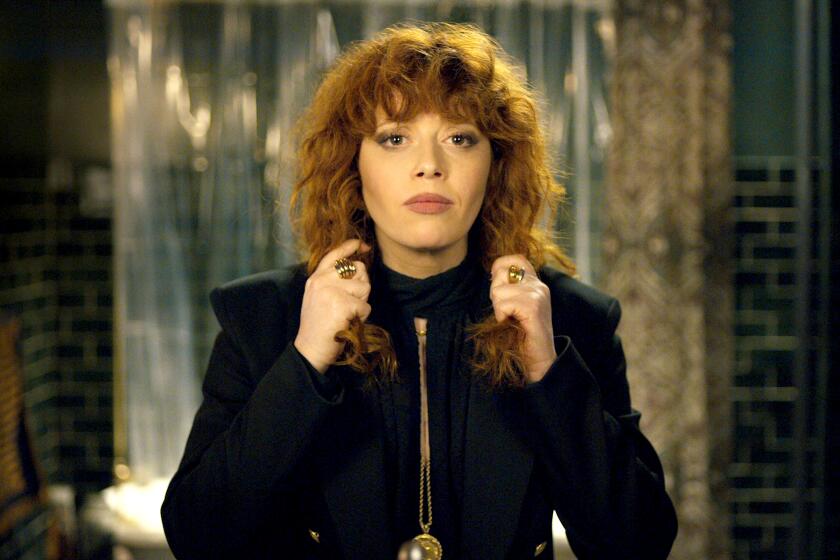How do you make ‘Blockbuster’ for the streamer that helped kill it? ‘Call out Netflix’
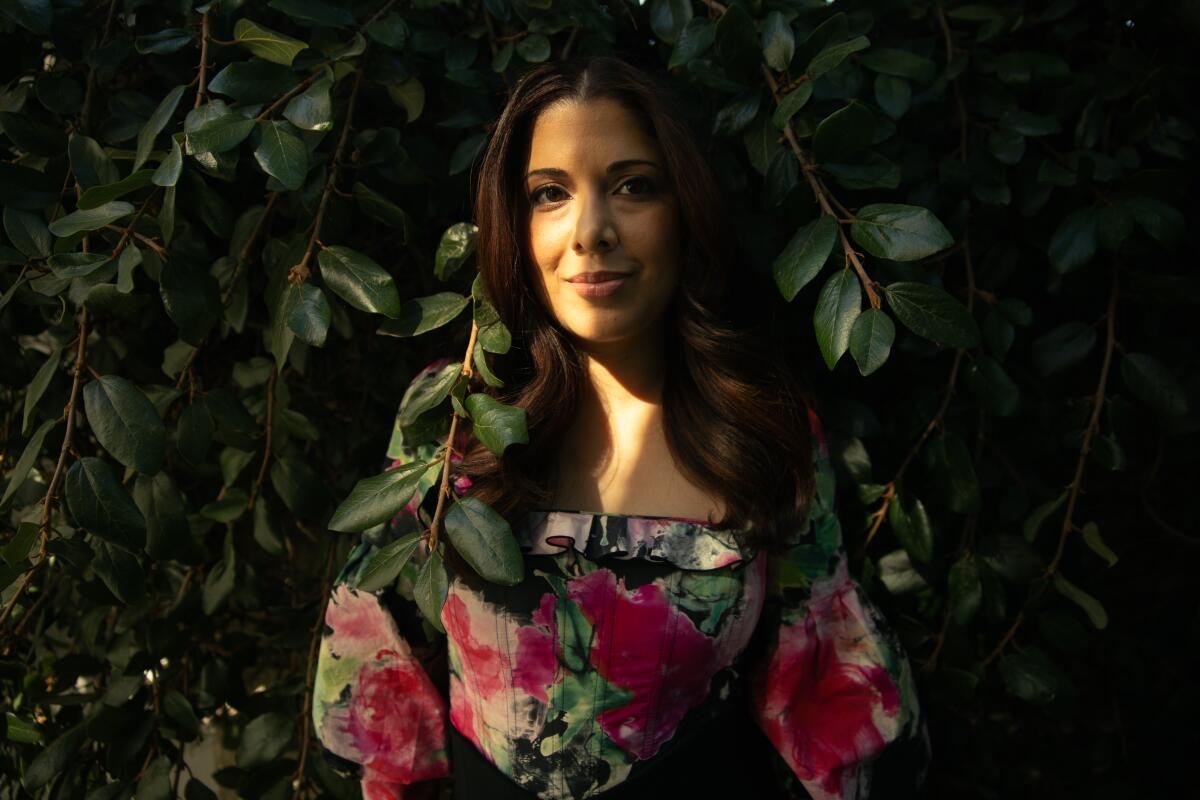
- Share via
Everyone who grew up in the “be kind, rewind” era and attended the film school of the masses — their neighborhood Blockbuster — has a story about roaming the store in search of the titles that left a lasting impression on their cinematic development: “Raging Bull,” “E.T.,” “Do the Right Thing.” Vanessa Ramos, the creator and showrunner of Netflix’s comedic ode to the movie rental franchise, could list what those films were for her if she thought about it long enough.
Or she could light up telling you about the time she got her kiddie hands on “Rock-a-Doodle.”
“There was a Blockbuster by my house and on Fridays, once my dad got home from work, we would go as a family and we would pick three movies,” Ramos says, recalling the 1991 animated musical comedy about an Elvis Presley-like barnyard rooster. “My brother and I got to pick one that we had to both agree on, but we never agreed on anything except for this movie called ‘Rock-a-Doodle’ that was very clearly based on Elvis, but also a small child’s hallucination at the end. There were other Blockbuster memories, of course, but it’s the one that sticks out — ‘Rock-a-Doodle.’ Childhood at its best.”
Fast-forward a few decades and she’s channeled that nostalgia into a series that will inevitably trigger wistfulness in viewers. But her workplace comedy is very much set in the present day, following the lives of employees working at the once-booming franchise’s last operating store in Bend, Ore. Leading the ragtag group of employees is store manager and analog-geek Timmy Yoon, played by Randall Park, who is doing everything in his power to keep the doors open and his workers employed.
“I kind of just sat down and started thinking, ‘What kind of person would be holding onto the last Blockbuster in this day and age?’ And how it would have to have a deeper meaning — someone who can’t quite let go of the past but in a sort of dreamer way,” Ramos says. “I started developing it early fall 2020, so it was in the thick of the pandemic, and I adopted this beagle puppy who was biting me all the time. I was like, ‘OK, this dog hates me, I miss my family. I’m by myself in this one-bedroom apartment.’ And it became a way to work through that.”
From her home in Los Angeles, Ramos spoke to The Times over videoconference about the irony of “Blockbuster’s” streaming home, figuring out her approach to a will-they/won’t-they dynamic and not wanting to pigeonhole her storytelling.
Hollywood’s most influential showrunners talk with The Times about how they broke into the business, the shifting TV landscape, their writing process and more.
Calling out Netflix
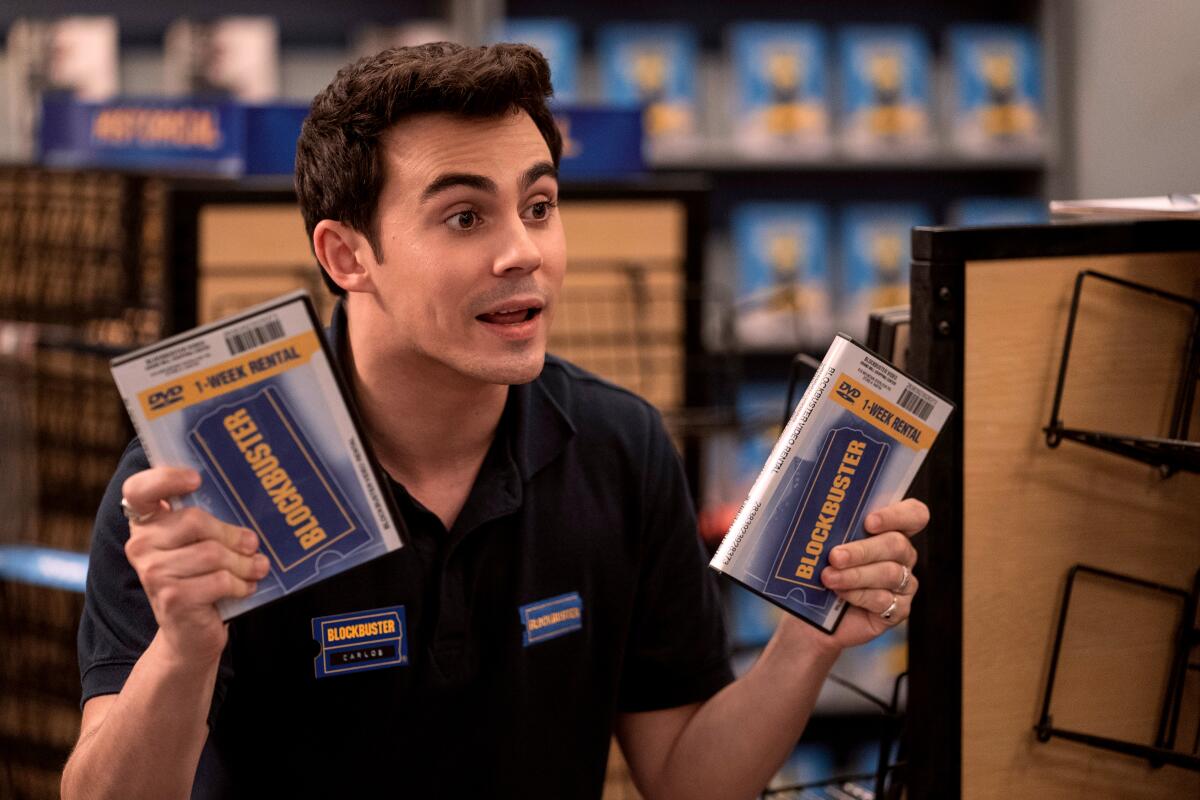
Under her deal with Universal Television, Ramos first brought the pitch for “Blockbuster” to NBC. When the network ultimately passed, Netflix ordered it to series — a decision with meta-textual undertones, given that the company rose to prominence around the time Blockbuster Video’s grip on home entertainment was collapsing. (Blockbuster went bankrupt in 2010.) The 10-episode sitcom, which also stars Melissa Fumero (“Brooklyn Nine-Nine”), chronicles what it takes for a small business to succeed as the culture shifts. How’s that for irony?
I understand the sentiment that this feels like Netflix is wearing the blood of their enemies. But at the same time, Dish [Network] owns the rights and they had sold the rights. Someone was gonna make this and it’s like, why can’t it be me? At least I got to do it in a way where I have this diverse cast. Netflix has given me a lot of freedom. And who’s to say, because I didn’t get that far in NBC’s process, but I do think it would have been a bit more watered down. The one thing that was important to me that Netflix understood was being able to call out Netflix to an extent — like “The Great British Bake-Off” joke.
The show opens with Timmy helping a customer who hasn’t visited the store in three years. “I’ve been meaning to come in ... I’ve been doing Netflix, you know, like, well, everybody. But their algorithm keeps recommending ‘The Great British Bake-Off,’ which is a trigger for me since Amanda left me for a pastry chef in Manchester she met on Facebook.”
I think it would have been very weird had we not acknowledged it. I’m just grateful anybody made it cause I was told so many times no one gets a show on their first try. I was already thinking of that podcast “Dead Pilots Society,” for pilots that didn’t get picked up. I was like, “Oh, I can get on that.”
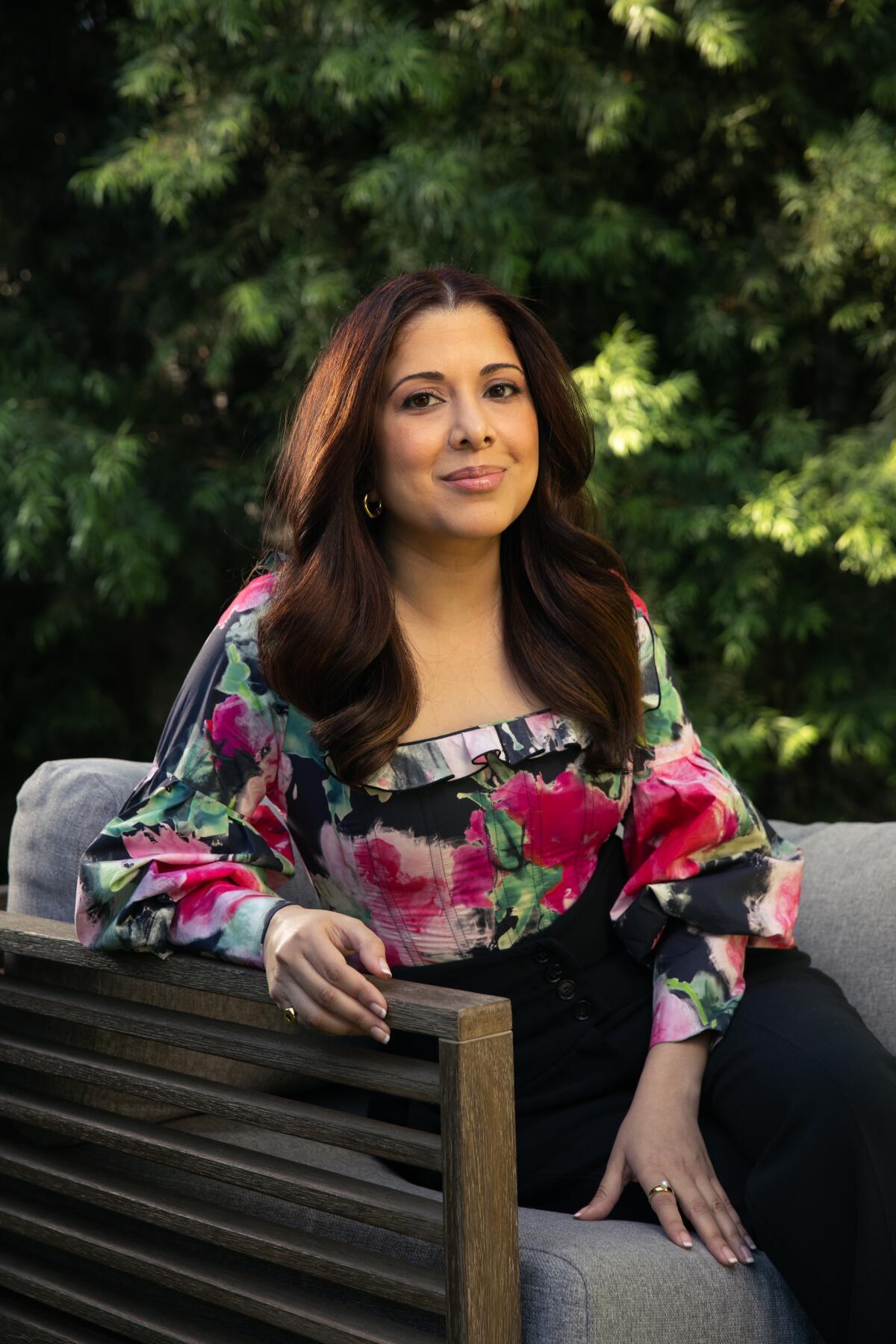
‘It takes a room full of people to break a story’
Ramos cut her teeth in the scripted space writing for cult-favorite workplace comedies “Superstore” and “Brooklyn Nine-Nine.” So when it came time for her to helm her first series, she was ready to assemble her own universe of employee misadventures and daily antics.
It is weird to do a thing about a video store in 2022, but it is coming off a time where we felt very isolated. It was easy to use that craving for human connection and incorporate that in the show, like Timmy being able to like look at someone and go like, “Oh, I know what movie you need right now. And you’re gonna have a great weekend.” And it was a little bit of wish fulfillment for me, from being isolated and running out of things to watch, and there is a dog biting my hair anytime I have like a Zoom call. I needed to find an escape.
What I love about workplace comedies is that it feels like you still get the family dynamic, but you have characters of different backgrounds with completely different life experiences that can use the emotional tools in their toolkit to help each other through life. Like in Episode 8, “Special Guy Day,” Timmy uses this thing his mom used to do to cheer him up when he was a kid. Also, in a workplace comedy you get to have fun with the different weird customers that come in and the various forces the employees have to band together against to get through the day.
As far as coming from a joke-writing background into narrative — my brain had been trained for years to hit the joke and get out. The goal back then was to figure out the most creative way of saying something simple, but it should be short and punchy. Writing an act of a television show felt daunting — much less a whole episode — but I learned on the job. I don’t think I fully understood story breaking until Season 3 of “Superstore.” I think that came from being in the room and watching people like [“Rutherford Falls’”] Sierra Teller Ornelas and [“Blockbuster” writer/executive producer] Jackie Clarke at the whiteboard placing the different colored cards for different stories, asking great questions about where a character would be coming from emotionally or what their drive was, then seeing how everything laid out and how the stories usually dovetailed at the end. Also, I learned a lot from watching other writers pitch. When I first started, I thought you had to pitch a fully broken-out story as a staff writer, but it takes a room full of people to break a story.
I was raised as a writer by the “Superstore” room. [Creator Justin] Spitzer had us sit with the editors when it was our episode and that’s something that not only made me a better writer and on-set producer, it also prepared me for the production side of showrunning maybe more than anything else. As far as “Brooklyn Nine-Nine,” I came in midway through Season 6, so it was very much a well-oiled machine by then. But they had something in the writers room that I hadn’t seen before: a corkboard with different colored cards and the episodes listed on top so you could see which character had big stories in what episodes, to make sure all of the characters were well served throughout the season.
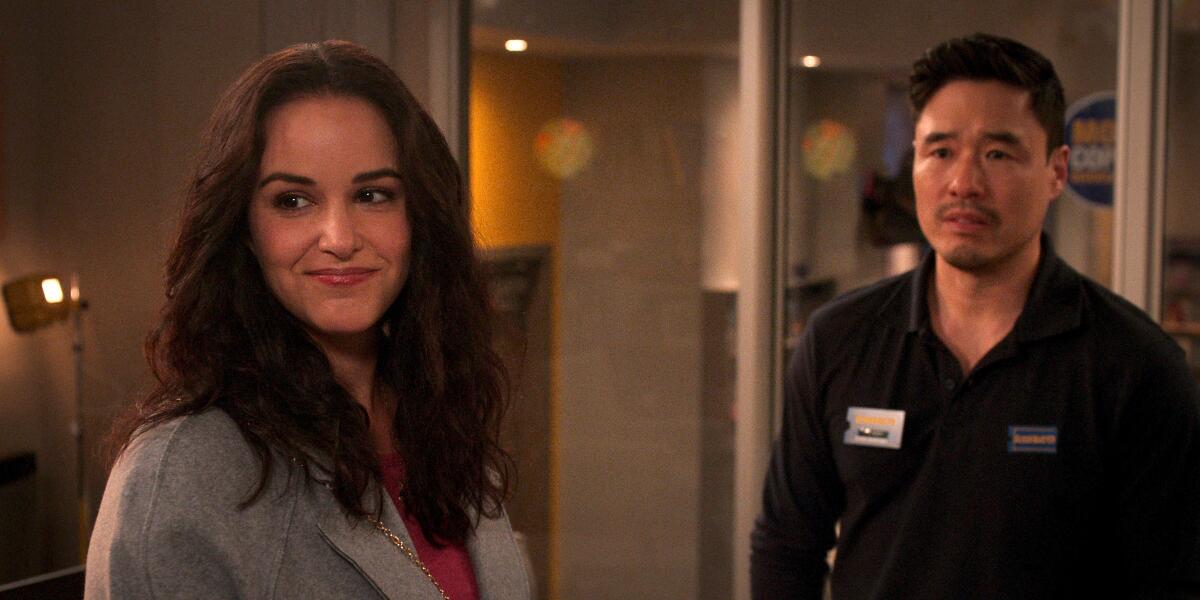
Making the will-they/won’t-they romance work for streaming
A hallmark of workplace comedies is the workplace romance — and the will-they/won’t-they tension is very much in stock at “Blockbuster.” If Timmy’s first love is movies (and quoting them), his former high school crush Eliza (Melissa Fumero) is a close, deeply suppressed second. Timmy hired Eliza, who left Harvard after one semester to start a family, as his trusted No. 2. But with Eliza’s marriage experiencing some strain, the possibility of something more is bubbling.
Ramos says she turned to the enduring popularity of the Jim and Pam dynamic in NBC’s workplace sitcom “The Office,” as well as the Jake and Amy relationship in “Brooklyn Nine-Nine,” for inspiration in crafting Timmy and Eliza’s story.
I love figuring out a will they/won’t they. My instinct is always to slow play as much as possible. I went back and looked at other ones. People were like, ‘Well, Jim, and Pam did this.’ But then also, as I did my research, I was like, “‘The Office’ had a six-episode first season and then like 24 [episodes the next season]. And I think in those long orders, you can really build these characters and see who they are independently before they fit together. So that was a little bit of a challenge — how do you effectively do that in 10? Melissa and Randall had such great chemistry out of the gate that it actually wasn’t as tricky. I knew in Season 1 that I wanted them to be like ships in the night. It was just a matter of trying to do that in a satisfying way for the audience, to where it’s like you feel that they are nearly there.
I was very aware that in a perfect world, viewers are diving right into the next episode. If I was on a week-to-week thing, I don’t know that I would have started from a place of like, “This is what’s going to happen in the finale.” But with streaming, I think you have to go, “OK, what do we need? What exactly are we building towards and what are the emotional breadcrumbs that we need to drop in the different episodes?”
We surveyed The Times TV team to come up with a list of the 75 best TV shows you can watch on Netflix. As in, tonight.
‘Just living lives like everybody else’
Growing up in San Antonio, Texas, Ramos describes herself as an incredibly shy kid. She wasn’t the best at making friends so she spent a lot of time at home watching a considerable amount of stand-up comedy. And she found inspiration in one of the masters of insult humor.
“In my early teens, I discovered Greg Giraldo. For me, that was a turning point, because I had never seen a Latino comic and his whole thing wasn’t like, “Here’s Latino jokes.” He was doing observational stuff and it was like, “Oh, you can just talk about what everyone else is talking about. Because of how you look, you don’t have to make that your whole thing.” Anything he did, I watched. And that’s kind of how I learned joke writing. If something made me laugh, I would dissect it the way super smart kids pull apart a computer to put it back together and see how it works. I kind of love like the puzzle of it.
After graduating from Texas State University, Ramos moved to Los Angeles and worked the box office at iO West, an improv theater, and eventually began doing stand-up. She would get asked to write jokes for comics making appearances on shows like “Chelsea Lately” before more earnestly beginning her television writing career as a staffer on the Comedy Central Roast, crafting barbs for the likes of Roseanne, James Franco and Justin Bieber, and late-night game show “@midnight.” Following years of writing on prime-time TV comedies, “Blockbuster” marks Ramos’ debut as a showrunner, joining a small but mighty club: just 1.5% of showrunners in Hollywood are Latino, according to the Latino Donor Collaborative. Like Giraldo, Ramos wanted to create work that wasn’t constrained by her identity.
I had an agent early on who would basically exclusively put me up for things that were very Latino-focused, like this is the only place you can go. It wasn’t the right fit. I’m a joke writer. I just want to write comedy. I want to write funny jokes people can say to each other — seemingly in a workplace, because it’s all I’ve done. And then I ended up with reps who very much understood me and would bring things that were interesting, your “Superstores” or your “Brooklyns” where it’s like you have these great Latinas in the cast, but it’s not their entire identity. It’s of course an essential part of the character and you find a way to write to that. But it’s like, on the day to day, they’re just living lives like everybody else.
More to Read
The complete guide to home viewing
Get Screen Gab for everything about the TV shows and streaming movies everyone’s talking about.
You may occasionally receive promotional content from the Los Angeles Times.
